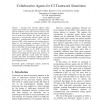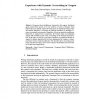403 search results - page 33 / 81 » An Adaptive Architecture for Physical Agents |
GECCO
2005
Springer
15 years 5 months ago
2005
Springer
The nature of computer networks and the manner in which network services are provided are changing dramatically. Network architectures that employ virtual mobile agents to provide...
IAT
2008
IEEE
14 years 12 months ago
2008
IEEE
TD-FALCON (Temporal Difference - Fusion Architecture for Learning, COgnition, and Navigation) is a class of self-organizing neural networks that incorporates Temporal Difference (...
102
click to vote
ICAI
2003
15 years 1 months ago
2003
– Existing team training software often requires that trainees be organized as physical teams and the members of the same team be trained at the same time. To demonstrate that te...
100
click to vote
ECAL
2007
Springer
15 years 6 months ago
2007
Springer
Anticipation is one of the key aspects involved in flexible and adaptive behavior. The ability for an autonomous agent to extract a relevant model of its coupling with the environ...
OTM
2007
Springer
15 years 6 months ago
2007
Springer
Component-based middleware frameworks that support distributed agent societies have proven to be very useful in a variety of domains. Such frameworks must include support for both ...


